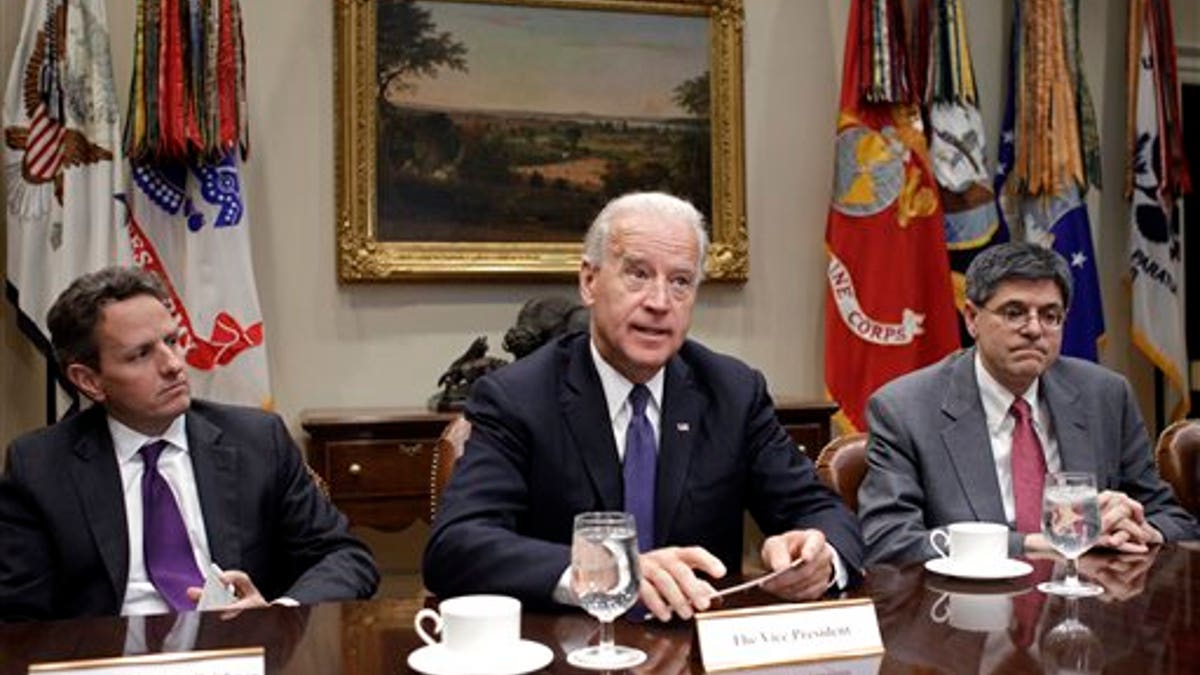
December 2010: VP Joe Biden and Treasury Secretary Tim Geithner during a meeting at the White House. Biden is to begin leading a series of bipartisan talks this week on reducing the debt. (AP)
Obama Can Double Down or Cash Out with bin Laden Winnings
"The death of Usama will not put pressure on the Taliban to negotiate. The Taliban are an Afghan movement, while al Qaeda is an international organization."
-- Former Taliban Foreign Minister Wakil Ahmed Muttawakil, talking to the Wall Street Journal
President Obama has a unique opportunity. A decade’s worth of intelligence gathering and terrorist hunting brought him the head of Usama bin Laden, so what will he do with it?
Obama will start to lay out his post-kill political strategy on Thursday with a visit to Ground Zero in New York.
- A Look into the Compound Where Usama Bin Laden Was
- Usama Bin Laden
- Bush-Era Interrogations Provided Key Details on Bin Laden’s Location
- Obama to Visit NYC’s Ground Zero, Calls for National Unity Like After 9/11
- CIA Looks for New Clues on Al Qaeda Trail, Reviews Evidence From Bin Laden Compound
- Obama Weighed Several Options Before Sending Navy SEALs to Get Bin Laden, Sources Say
- Radical Cleric Tied to Bali Bombings Says Death of Usama bin Laden Won’t Kill Al Qaeda
The nation-building war in Afghanistan has become increasingly unpopular and Obama’s decision to enter the Libyan civil war had further depressed his approval ratings on foreign policy. The killing of bin Laden, lavishly celebrated by the administration, will temporarily erase those deficiencies and give the president a chance to reboot his international approach.
Those opposed to the expansive war effort in Afghanistan are hoping that Obama uses the moment to accelerate the withdrawal process set to begin in July – to declare victory and go home. Democrats who are playing up the courage of the president and suggesting his decision to authorize the killing of the butcher of 9/11 are hoping to provide the president political cover to allow him to start a rapid reeling in of American overseas commitments.
Those in favor of the war are hoping that Obama will use the moment as a chance to rally public support for the conflict – that having tasted the benefits of being a war president, Obama will be enticed to expand his “more Bushian than Bush” foreign policy.
What seems most likely, though, is that Obama will use the moment to build consensus for his compromise strategy – a slow deflation of the war effort in Afghanistan combined with a gradual buildup of the covert war in Pakistan.
The failures or complicity of the Pakistanis in allowing bin Laden to be living unmolested in their midst for so long will tend to complicate this concept, even if Gen. David Petraeus will be the man charged with waging the covert war as CIA director. Republicans and Democrats alike are looking for ways to punish the Pakistani government with curtailed aid and heightened scrutiny. A plan that calls for increasing aid and reliance will be a tough sell, even with bin Laden as fish food.
The Obama team will also look to permanently insulate the president from the criticism that he is soft on terror. The Obama 2012 campaign can look forward to an easy four-word answer to any Republican who accuses Obama of inconstancy or weakness on foreign policy: “We killed bin Laden.” Of course, George H.W. Bush had the first Gulf War to protect him in 1992 and still lost on the economy.
Obama’s victory lap on bin Laden will certainly help his previously saggy approval ratings, but its effect on his presidency and re-election chances depends on what he plans to do with the bounce.
Inept, Crooked or Both: How did the Pakistanis Miss bin Laden?
“Some in the U.S. press have suggested that Pakistan lacked vitality in its pursuit of terrorism, or worse yet that we were disingenuous and actually protected the terrorists we claimed to be pursuing. Such baseless speculation may make exciting cable news, but it doesn’t reflect fact.”
-- Pakistani President Asif Ali Zardari in a Washington Post op-ed entitled “Pakistan Did its Part”
Usama bin laden lived for five or six years in a million-dollar house in a neighborhood filled with retired Pakistani military brass.
So the question is, how widespread was Pakistani complicity with hiding the terror master?
It frustrates Americans to think that bin Laden has been living in a comfortable house surrounded by his family since 2005. It had been some comfort to imagine him moldering in a cave listening to the buzz of drones overhead.
But the home may have actually been a prison, rather than a hideout. Some have raised the possibility that the highly secured home that lacked any electronic connection to the outside word was actually built to hold bin Laden by Pakistanis playing a double game with the U.S. and the Taliban.
Others have said that malign elements inside the Pakistani military/intelligence community were simply aiding bin Laden. Bin Laden would have needed a support network in the country of some kind, so we know someone was helping him.
The third scenario is that the country’s security forces were so obtuse that they didn’t notice the conspicuous razor-wired compound that stuck out like a sore thumb in an upscale neighborhood near a key military base. Given the military and intelligence successes that the Pakistanis have had in the past, this seems rather unlikely. These guys are some of the best in the world and have been fighting (and sometimes helping) Islamists longer than almost anyone else.
Imagine such a facility going unnoticed in West Point, N.Y., Annapolis, Md. or 1,000 yards from the Army War College in Carlisle, Pa. Not very likely.
President Asif Ali Zardari’s government was already on the precipice of a fall and if popular sentiment gathers against him for the raid – particularly galling to Pakistanis already sensitive about the escalation of the covert U.S. war against the Taliban in Pakistan – it could mean serious unrest in the nuclear-armed nation of 170 million.
Geither Buys Time for White House on Debt Debate
“Aug. 2”
-- New deadline for raising the $14.3 trillion federal debt limit
Treasury Secretary Tim Geithner informed Congress on Monday that the drop-dead date for the federal government exhausting its borrowing ability had been pushed back by a month, taking considerable pressure off the negotiations with congressional leaders that begin this week.
Geithner credited better than expected tax revenues and the beginning of “extraordinary measures” for the extension. The “extraordinary measures” include dipping into surplus cash hoarded from the proceeds of government bailouts. Geithner says that he can continue at his slower pace of borrowing until May 16 and then run on reserve funds until the beginning of August.
After that, the government would have to begin a partial shutdown in order to avoid defaulting on existing loans.
The announcement comes at a very helpful time for the administration. Moderate Senate Democrats had grown increasingly uneasy about the idea of granting the president more borrowing power without demanding strict curbs on spending. With the debt limit fast approaching, it looked likely that moderate Senators would be able to exact a high price for their cooperation.
When Vice President Joe Biden convenes the first meeting of the debt-limit negotiators, led on the Republican side by House Majority Leader Eric Cantor, the veep will find his hand strengthened by Geithner’s new deadline.
Plus, the bipartisan Gang of Six in the Senate, the group trying to build a legislative version of the recommendations of the Simpson-Bowles Debt Commission, has run into roadblocks of late, prompting the Democratic leaders, like Senate budget boss Kent Conrad, to warn that without a deal soon the group will cease to be relevant. Geithner’s granting of a one-month reprieve gives the Gang time to work out a deal.
The delay pushes the final battle over the debt cap closer to the major showdown over the budget for the next fiscal year, which begins on Oct. 1.
Obama has three face-offs with House Republicans this year over spending and debt. The first was over the unfinished spending plan for the current year, then comes the breached debt limit and finally will be the 2012 budget. Each confrontation offers the GOP the chance to extract concessions from the president on spending. Squeezing the debt limit and the budget so close together increases the chances for a larger-scale bargain to be cut on current and future spending.
Tax Base Narrows Less than Half of Households
“51 Percent”
-- Percentage of U.S. households owing no federal income tax in 2009 according to a congressional report to be released today
The takers/makers index has crossed the halfway point.
A new study of 2009 tax returns by Congress’ Joint Committee on Taxation says that more than half of American households paid no federal income tax. And nearly a third of those who filed were actually beneficiaries, receiving free money in the form of tax credits.
A related report from the Congressional Budget Office shows that the top 40 percent of earners –- those making more than $94,100 – paid nearly 90 percent of taxes in 2007.
As President Obama pushes a plan to increase the tax rate for the top earners to 40 percent from 35 percent, Republicans on the Senate Finance Committee are warning that the narrowing of the American tax base is a dangerous trend.
Many of the households in the non-paying 51 percent are the poor and elderly. But many American workers who pay no income taxes don’t realize that they are getting off the hook or are even net beneficiaries because of the way withholding works. When they get a tax refund, they may not understand that the refund exceeds what was taken out of their weekly paychecks.
Some tax experts warn that a narrowing tax base can create problems beyond just overburdening one segment of the population, but can actually make for a disengaged citizenry. When a majority pays no taxes, there are fewer stakeholders concerned about how the government is stewarding its resources.
Democrats say that this inequality is a result of the fast growth of incomes for top earners during a period of stagnation or reduction for the poor and unskilled workers. The narrowing base, they say, is evidence that taxes for the wealthy need to be increased since they are earning so much more.
Part of the discussion on the shrinking American tax base has to do with the complexity of the tax code. As is the case with corporate tax rates, America has some of the highest rates for upper incomes in the world, increasing the incentive for finding (or lobbying for the creation) of new loopholes to beat the taxman.
As the 2012 budget battle plays out, the high percentage of non-taxpayers will be part of the argument in favor of tax simplification. Over the years Republicans have gone in for lower income tax subsidies in order to wheedle generally lower rates out of Democrats. The result has been a tax system that also functions as a welfare program.
And Now, A Word From Charles
“I think the aura -- the bump [President Obama] will get -- will wear off the way it did for [President George H.W. Bush] after the Iraq war. He was at 90 percent. But I think Obama will always have an answer to those who accuse him of being weak on foreign affairs. He is the man who killed Usama bin Laden.”
-- Charles Krauthammer on “Special Report w/Bret Baier”




